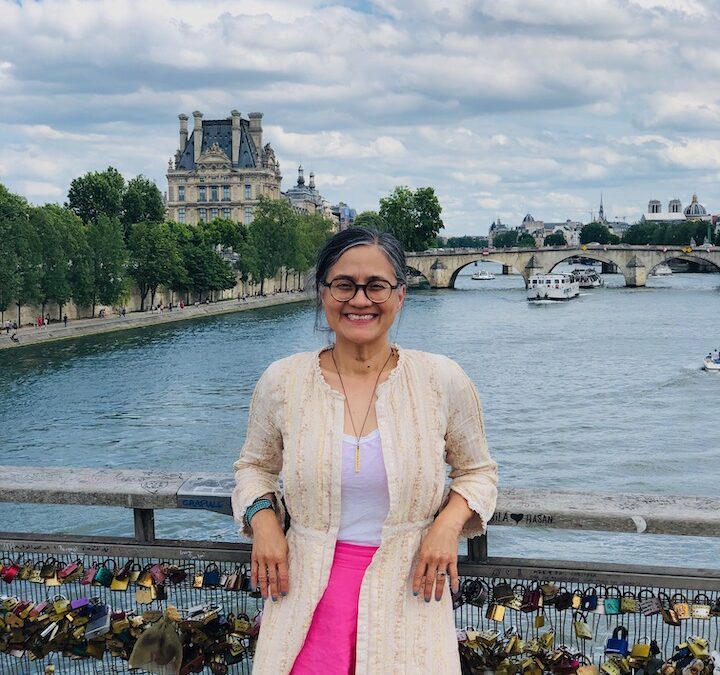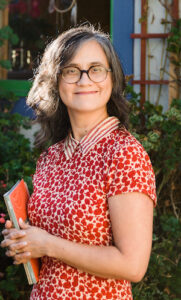2:55 pm Pacific Standard time (11:55 pm Paris time):
At the boarding gate, I was asked to remove my glasses so that the facial recognition machine could do its job: validate me as a passenger of Air France Flight 0085 bound from Los Angeles for Paris. Could the machine detect the overwhelming uncertainty that was swelling in my brown eyes? My thoughts seemed lost in sounds and flurry of travel crowding the air – loud announcements of departing and arriving flights, wheeling luggage, and crying children. As I boarded the airplane, with heaviness and confusion leading each step, my husband made his way toward the exit of the Tom Bradley International Terminal – back onto the Airbus, the one that only three hours earlier had dropped us both off at the front doors. Only now, he was bound back to Santa Barbara. At the check-in counter an hour earlier, we had learned that since his passport was due to expire less than three months from our return date from France, he would not be allowed to travel until it was renewed. I wondered if it was a metaphor for our lives: I was reluctantly traveling toward latent parts of myself, while he was pressed to recertify his identity in order to travel.
While time felt propelled by spontaneity, a sense of adventure was the furthest thing from my heart. Wasn’t one of the benefits of a marital voyage to explore novel terrains together? Although the logistics of getting him to Aix-en-Provence via Paris to meet me at a conference on Modernism – where I would be presenting on the works of Anaïs Nin – were challenging, they were not insurmountable. Yet, blurring my anxiety was the possibility that he would not be able to renew his passport on time, in which case I would complete the trip on my own. I had the one piece of luggage I had hastily managed to repack on the cold terminal floor, including two dresses, a European adaptor, and a pair of white sneakers. The ambiguity of the situation made it difficult to synchronize my desire to resume on this trip, with my simultaneous hesitation. Unlike the facial recognition machine, I couldn’t match the passenger boarding with the restless woman making the trek.
The enormity of my resistance to traveling alone is the real thing that burned away at me. Why had I lost a sense of identifying myself as capable and fully willing to travel sola? On the other hand, I reminded myself that I am not one who avoids solitude. After all, I was used to an introverted world in the seclusion of my writing room. When I didn’t get it frequently enough, I became fidgety, like a hungry hummingbird in search of nectar. Yet I was beginning to understand that my appetite for solitude was not synonymous with loneliness. And now I asked myself how one inhabits a city on one’s own. The aloneness I resisted feeling was akin to the “particular flavor to the loneliness that comes from living in a city, surrounded by millions of people,” which Olivia Lang acutely observes in The Lonely City. Any sense of autonomy was buried under waves of vertigo: my footing had lost its ground. Vulnerability felt like an absence of courage. Why travel to be lonely, fear-filled?
The images I could recall of me traveling alone dated back to the decade of my twenties and thirties. The memories of those years are tangled in my mother’s voice declaring that traveling was something I did “sola con me alma” (alone with my soul). During my twenties, dragging my insecurities along and feeling like a fugitive in a world I didn’t seem to belong to, I had discovered the mesmeric charm of labyrinthine medieval city streets, the illustrious Reina Sofia and fell in love with the glow of the Arno river. I had spent countless days – alone, at my will – sunbathing topless on black sand beaches in Greece. Then, the next decade, in my thirties, grieving the end of a marriage, I ventured through South America where Spanish washed over me and in just a few days the local colloquialisms sprouted inside of me, gestured through my body and intoned in the streets. I borrowed idioms shamelessly as the Spanish speaker in me was welcomed, like a daughter. Now, the ritual of traveling alone somehow seemed out of practice, and as if it had its own statute of limitations: up to thirty, or when life was being punctuated by a paramount shift. What life change was I not seeing unfolding before me?
***
By the time I found my seat, there was a French man of medium stature standing in the aisle. In English, with a thick French accent, which to my ear sounded as if he was adding a soft “z” sound to the beginning of each word. He offered to help me put my backpack – carrying three New Yorkers, Olivia Lang’s Lonely City, Anaïs Nin’s Diary Volume One, my draft conference paper, and my A. Lorde sweatshirt – in the overhead bin. As if trying out my self-reliance in the moment, I declined his offer. Once we both took our seats, I took it upon myself to offer an explanation for the vacant seat between us. In a tone of disbelief, I shared mine and my husband’s story. With his green eyes looking straight at me, he offered, “that’s too bad. I wish him good luck on Monday.” He went on to tell me about his own experience when his passport was on the verge of expiration. He had been traveling from Japan and was on his way to Los Angeles via Madrid. His passport would soon expire, so he couldn’t enter Madrid nor get on the airplane to Los Angeles. He was sent to Paris directly. Then, following a short pause, he went on to share, “I am on my way back home to Bordeaux via Paris. I split my time between working in Los Angeles and going home to Bordeaux.” Reaching for his headphones, he added, “my wife and children live there, and the kids will soon be on summer holiday, so I’ll be there for a few days then go to Japan.” When he described his jet-setting lifestyle with utter ease in his voice, I remembered how patriarchy, no matter in what century or culture, has accepted that men leave home while women stay at home. Women’s aspirations are forced to include creating a home for children and men. I wanted to ask him if his wife had the same freedom; if she opted, could she parent from afar.
***
As I contended with what traveling alone felt like in my late 40s, I sensed that another state of my being was viscerally being revealed. I seemed to be living a moment akin to what Anaïs Nin describes as a realization that one is living a sheltered life in one’s own “delicate world.” She writes: “Then you read a book (Lady Chatterley, for instance), or you take a trip… and you discover that you are not living, that you are hibernating.” It occurred to me that the energy I had contributed to creating a marriage, for which I felt fortunate to have, had in turn eclipsed facets of my autonomous identity. I thought of Simone de Beauvoir’s relentless struggle between craving her freedom and being led by Sartre. Choosing not to marry Sartre did not free her from his profound influence in her life. Had I retreated into love, now making the cost of being with myself this trip feel like too great of a risk? What else in me was holding back?
***
Then, in a liminal state of falling asleep and being awake, a thought entered my mind and made its way, like a colorful strand, into a monochromatic string of sentences crafting my understanding of the moment: I have been to Paris five times before; the last trip as recent as last summer with my husband. Even if three of those five times were in my early twenties, moving around with less consciousness, wearing a different face, this thought increased my paradoxical sense of confusion and anxiety for what was unrecognizable in me. What was I afraid of, really?
As the hours ticked away on my digital clock, the thoughts in my mind now focused on the fact that I was going to France to present at a Modernist conference about Nin’s exceptionalism within her self-probing. In my essay “Anaïs Nin’s Mythic Method: Fact, Fiction and Myth” I argue that her exceptionalism in part stems from her ability to create a poetic sense of the world through a mythopoetics of her own, including attention to the quotidian details of emotional existence. Nin spent a lifetime making a virtue of her vulnerability, and in her diaries reveals her flaws and paradoxes, attesting to the risk she took as a writer. I remind readers that Nin’s credo offers us a philosophical justification for why the cultivation of an interior world is essential to address calamities in society: not merely to resist alienation from oneself, but to better bridge our knowledge of others. For Nin, intimacy with our experiences is a powerful way of knowing one another.
***
As if traveling through clouds linked to a permeable recognition system, 35,000 feet in the sky, I sensed conviction for my trip swelling in my chest. The desire to orient towards home was no longer what I wished for. The distance between my husband and I no longer felt like that of two worlds. Instead, I had a sense of an inner compass ready and eager to guide me through the labyrinthine streets of Paris. It then occurred to me that as I had been estranged from the parts of me that thrive on spontaneity, the kind that summons courage, vulnerability and risk; they are the same things I was also struggling with in my aspirations to get my writing into the world.
At 9:35 am local time (12:35 am Pacific Standard Time) an announcement was made, in French, then repeated in English, we would be landing at Charles du Gaulle in Paris in an hour. It was 90 degrees when I stepped outside the airport terminal, and I recalled that in the alchemical process, heat is essential for transformation. I made my way to the taxi station and approached the taxi driver in his crisp white shirt and black slacks to share the details of my destination. We made our way through the city, “the opal that is Paris,” as Nin used to call it.
When I arrived at my rental on Rue Ternaux, my sense of orientation was my own. I dropped off my single piece of luggage – opened the tall windows to let in the fresh smell of the jasmine, coating the garden wall below, to perfume the room. I took the teal bistro table that was up against the white kitchen wall and arranged it as a small writing desk in front of the open window. Then, embracing vulnerability, I headed back down the sunlit hallway, descended the uneven, creaky oak, spiral staircase.
Walking up Rue Ternaux in the buzz of motorcycles, whizzing cars, and ruffling pigeons, I had the feeling that I was beginning anew.
______________
Clara Oropeza is a Latina writer and Professor of English Literature at Santa Barbara City College, California. Her book Anais Nin: A Myth of Her Own (Routledge) was published in 2019. Her work has appeared in Sagewoman and Between.


